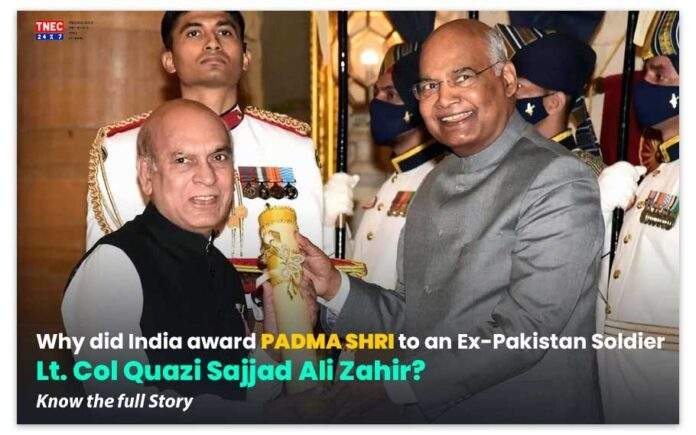Lt. Col Quazi Sajjad, a Pakistani soldier who deserted his army to help India liberate Bangladesh, has received the Padma Shri. Lt. Col Quazi Sajjad Ali Zahir’s information was critical in India’s 1971 war against Pakistan, which resulted in the foundation of Bangladesh. A young 20-year-old officer in the Pakistan Army serving in the Sialkot area managed to cross across to India in March 1971, as atrocities in East Pakistan escalated and genocide was planned.
Details about the Pakistan Army’s deployment and Rs 20 in his pocket were his valued assets when he stepped across, and he was interrogated by Indian border guards who suspected him of being a Pakistani spy. Some pieces of papers were recovered from his boots.
Questioned by military authorities
Soon after, he was brought to Pathankot, where he was questioned by top military authorities. The officers realized it was serious business when he handed documentation detailing the Pakistan Army’s deployments. The soldier was transported to Delhi, where he resided in a safe house for months before traveling to East Pakistan to train the Mukti Bahini in guerilla warfare in preparation for a fight with the Pakistani army.
Badge of honor
Lt Colonel Zahir proudly declares that he has had a death sentence pending in his name in Pakistan for the last 50 years, almost as if it were a badge of honor.
Also awarded
He has been awarded the Bir Protik, the Indian equivalent of the Vir Chakra for valour, as well as Bangladesh’s highest civic medal, the Swadhinata Padak. Lt Colonel Zahir has now been awarded the Padma Shri, one of India’s highest civilian honors, in honor of his efforts and contribution to India’s victory in the 1971 war against Pakistan, which resulted in the formation of Bangladesh.
‘For us, Jinnah’s Pakistan became a kabristan.’ -stated Lt Colonel Zahir
The atrocity committed against his people in then-East Pakistan sparked everything. “I have a photographic memory and recall every incident completely,” he adds as he tells his remarkable narrative. He recalls the reasons for his flight from Pakistan, saying, “For us, Jinnah’s Pakistan became a kabristan (graveyard). We were treated as though we were second-class citizens with no rights. We were a poor community. We never received the promised democracy; instead, we got martial law. Jinnah promised us equal rights, but we didn’t have any. We were handled as though we were Pakistan’s servants.”
An isolated human being
“I was an isolated human being as a member of Pakistan’s elite para-brigade in Sialkot. But then I realized I was three persons in one: me, myself, and I. So I began to consider which path to choose. I chose the Shakargarh road to Jammu, which was probably the least patrolled “He thinks back.
Coming from a background of Army
He is proud of all individuals who serve their nation as second-generation military commanders. His father was a British Army commander who served in the Burma (Myanmar) campaign during WWII. His adolescent brother was a member of the Mukti Bahini, which fought for Bangladesh’s independence.
Remembering the flight from Pakistan, the Battle of Shakargarh
He recalls gunfire from the Pakistani side when he crossed into India during his escape from Pakistan. In response, the Border Security Force (BSF) on the Indian side opened fire.
The gunfire continues…
“I jumped into a big gorge and was secure while the gunfire continued on both sides. I made it over the whole canyon and into India, where I was caught.” Later, he was brought to Delhi, where he met with high officials from several agencies for months.
Uninformed detention
“They never informed me that I was in detention. They fed me well and treated me well, but they asked that I not leave that residence in Safdarjung Enclave. Throughout the day and night, top officials approached me and spoke with me.” Colonel Sajjad, who refuses to accept credit for India’s victory in the sectors in which he gave information, claims the Indian Army advanced 56 miles into Pakistani territory during the Battle of Shakargarh.
Pakistanis fought for a wrong cause.’
He was dispatched from Delhi to East Pakistan, where he worked in a camp near the Tripura/Assam border in a hilly location with 850 Mukti Bahini soldiers, training them in guerilla warfare.
“Soldiers fight for justice when they battle; Pakistanis fought for an unjust cause. The army that is complicit in rape, murder, pillage, and extermination lacks morale, which is why they surrendered.”
“Regrettably, they take you for a ride and assault Kargil and other Indian cities. They were unappreciative that Indian military had spared their lives “He continues.
The best hour
Finally, Lt Col Sajjad addresses the young people of Bangladesh and India.
“We fought together and achieved a great victory in 1971; it was India and Bangladesh’s best hour.
However, younger generations are losing their beautiful past, which was 1971. We must educate our youngsters. It was awful, but there are many lessons to be learned for the good of society.”
The achievements of Colonel
The braveheart, who retired from the army in 1982, has written 54 books and was awarded the Swadhinta Padak (Independence Award), the highest civilian award in Bangladesh, in 2013. He also wrote 26 novels on the independence fight.












